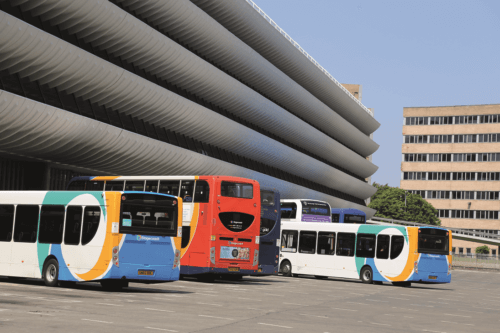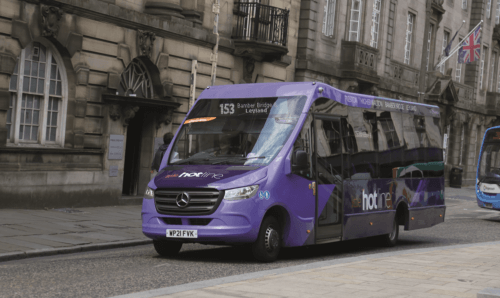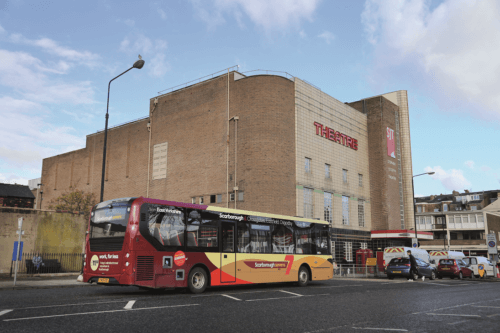
In the run up to the Autumn Budget statement, in which the Chancellor said that existing spending commitments would be maintained, industry bodies Bus Users UK, Campaign for Better Transport, the CPT and the Urban Transport Group called on Chancellor Jeremy Hunt to take decisive action to boost the economy by showing his support for local bus services.
“Buses are at the heart of our economy. They are the nation’s most used form of public transport with approximately four billion journeys made annually, and they are an essential service, with millions of people relying on buses for accessing education, employment, healthcare and high streets. Bus users have been estimated to spend £27 billion per year in our towns and city centres. England’s bus networks also contribute to lower carbon emissions, air pollution and congestion, with congestion alone estimated to cost the UK economy £8 billion a year,” the co-signatories said in a joint letter. “We are grateful for the support that the Treasury has given to local buses since the start of the pandemic, including the extension of the Bus Recovery Grant to March 2023. However, the shape of funding for local buses after that will be crucial for the survival of our local bus network. There is no doubt that difficult decisions will have to be made in the upcoming fiscal statement. Balancing the books is in the public interest, but this cannot be at the expense of our public transport network.”
The letter reminded the Chancellor that bus operators are already struggling with reduced demand on some routes, as well as severe driver shortages and increased fuel costs. Local authority budgets are also under severe strain, with many unable to afford continued support for services.
“We cannot afford to see this continue. Bus service cuts damage the economy, leave people socially isolated and with no access to employment or vital public services, damage our prospects of levelling-up and of reducing transport emissions. Investing in buses, on the other hand, would help achieve the Government’s net zero and levelling-up commitments,” the letter added.
A recent report by the CPT estimated that, if everyone switched to two bus journeys a month by 2050, it would result in 15.8 million tons of carbon dioxide savings, £29.4 billion worth of reduction in congestion and £14.9 billion worth of cumulative health benefits. The letter went on to praise the Government’s ‘commendable leadership’ by committing to reach net zero by 2050, and its manifesto promised a ‘transport revolution’ and London-style transport services offering more frequent, better-integrated services.
However, it warned that funding for local bus services in England outside London remains challenging, risking further cuts. It noted that: Only 40% of all Local Transport Authorities received funding for Bus Service Improvement Plans, and those that did received on average less than a quarter of what they had asked for; the Bus Service Operators Grant (BSOG) has fallen by 20% since 2012; bus use by concessionary passengers is still at 72% of pre-pandemic levels and reimbursement through the English National Concessionary Travel Scheme is due to reflect actual concessionary passenger numbers from April 2023; and the Bus Recovery Grant ends in April 2023, and any increase in passengers by that date is not expected to be large enough to make up the funding gap.
The signatories said that the industry recognises the need to move away from pandemic-related support in favour of a long-term funding settlement to replace it, and asked for measures to achieve that, namely:
- Protect spending commitments already in place on local buses and trams for this spending period;
- A short-term funding guarantee to ensure no further network reductions until reformed funding arrangements are in place;
- Targeted funding for Local Transport Authorities which lost out in the allocation of Bus Service Improvement Plans funding;
- Accelerated reform of funding arrangements for local buses and trams in England outside London featuring a single pot of capital and revenue ringfenced for local buses, light rail and trams, enhanced revenue funding to boost services across urban and rural areas and capable of meeting the National Bus Strategy aspirations, and long-term settlements for all Local Transport Authorities conditional on achieving a coherent set of objectives.
The letter was signed by Paul Tuohy, Chief Executive, Campaign for Better Transport; Graham Vidler Chief Executive, Confederation of Passenger Transport; Jonathan Bray, Director at Urban Transport Group; and Claire Walters, Chief Executive of Bus Users UK.

Response
Responding to the Budget, the CPT’s Graham Vidler said: “It’s encouraging that the transport budget has been maintained in the Chancellor’s Autumn Statement. In the immediate term, CPT will work with devolved areas to prioritise improving local bus services as part of levelling-up funding. Our longer-term focus is with the Transport Secretary Mark Harper to secure a fair share of investment for the bus and coach sector – the nation’s most popular form of public transport – which is crucial for the UK’s wealth and health.”
Reacting to the announcement that Vehicle Excise Duty will be charged on electric vehicles from 2025, Norman Baker of Campaign for Better Transport said: “This is a sensible first step towards reforming motoring taxation, but the Government needs to go further. It should begin working towards a pay-as-you-drive scheme as a fairer and more transparent replacement for both VED and fuel duty.” He added: “The Government could have filled much of the Budget black hole by cancelling a small number of highly damaging road building schemes – it is regrettable that it didn’t take the chance to do this.”
The RHA said that more support was still needed: “Today’s Autumn Statement could have gone much further to reduce the costs of doing business and the upward trend in prices,” the trade body said. “Costs for road transport businesses have increased by over 11% in recent months with fuel alone up by nearly 40%.
“Freezing the threshold for employer National Insurance will also increase costs of employment when costs for businesses are rising across the board.
“We welcome the energy support package for businesses until April, and the steps taken to assist businesses affected by the Business Rates revaluation, particularly the relief from rate increases as a result of property development. We will be working closely with the Government’s review of the Energy Bill Relief Scheme to ensure our industry’s critical role is properly considered and additional support maintained.”
RHA Managing Director Richard Smith commented: “We were disappointed that no further action has been taken to reduce fuel duty which would ease the cost of living for everyone. We hope that our proposed Essential User Rebate, an anti-inflationary measure which will help ease fiscal pressures in the supply chain and reduce the rising cost of living for everyone, will be considered for the Spring Budget 2023.”


